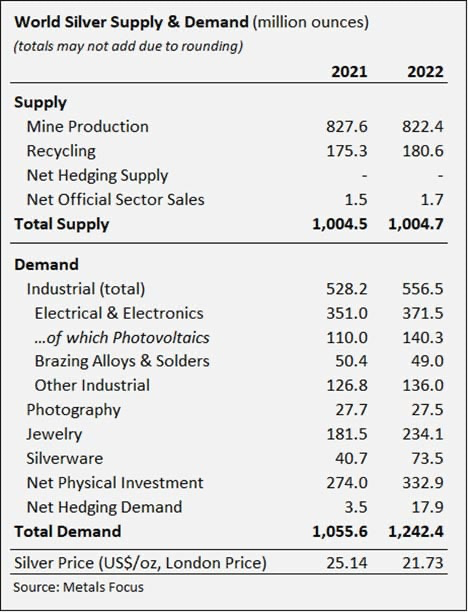Silver production is failing to keep up with rising demand. But you wouldn't know it by looking at the silver price.
Phillips Baker, CEO of Hecla Mining and Chairman of the Silver Institute, the metal's most prominent industry trade group, recently made a presentation at the London Bullion Market Association Global Precious Metals conference in Spain.
The presentation focused on silver's expected role in the transition to green energy, but it included some interesting detail on the market in general.
According to the Institute's press release,
"Delegates asked Mr. Baker whether we will have enough silver for the green transition. He replied in the affirmative, explaining that while the silver market is currently in a structural deficit, above-ground stocks of silver will be mobilized to meet the demand."
He added, however, that:
"there are no new significant silver deposit discoveries at present, and that geopolitical issues and mine permitting delays continue to be encumbrances to bringing new sources of mined silver supply to market."
According to the 2023 World Silver Survey, demand outstripped supply in 2022 by nearly 238 million ounces – "possibly the most significant deficit on record." Supply was about 20% short of what was needed to maintain equilibrium.
Silver demand rose in nearly all categories:

Meanwhile, mine output fell versus the prior year – confirming what the Hecla CEO said about the difficulties miners face in bringing new production online.
It is getting harder to find high-grade deposits, and it is more difficult and expensive to develop and operate a mine.
The structural deficit in silver has now run for two years consecutively. The shortfall was 50 million ounces in 2021. The massive imbalance between supply and demand should have generated an explosive move in the price last year, but it didn't. The paper price of silver finished just 4% higher for the year.
The data for 2023 won't be available for months, but another deficit is likely this year – making it the third consecutive year of deficits.
The shortfall must be met by pulling silver from above-ground supplies. There are well less than 2 billion ounces available on exchanges and other publicly disclosed silver stockpiles across the globe, and, beyond that, the amount of silver in the form of coins, bars, rounds, silverware, and other scrap is less known.
To be sure, the massive supply of paper silver contracts that can be created on the trading exchanges – especially with the use of leverage – does create the potential for abuse, manipulation, or price dislocations.
However, with silver demand outpacing new mine supply each year, these supply deficits seem likely to put upward pressure on the silver price in the coming years. In the end, actual physical silver, not paper, is required to satisfy physical demand.

